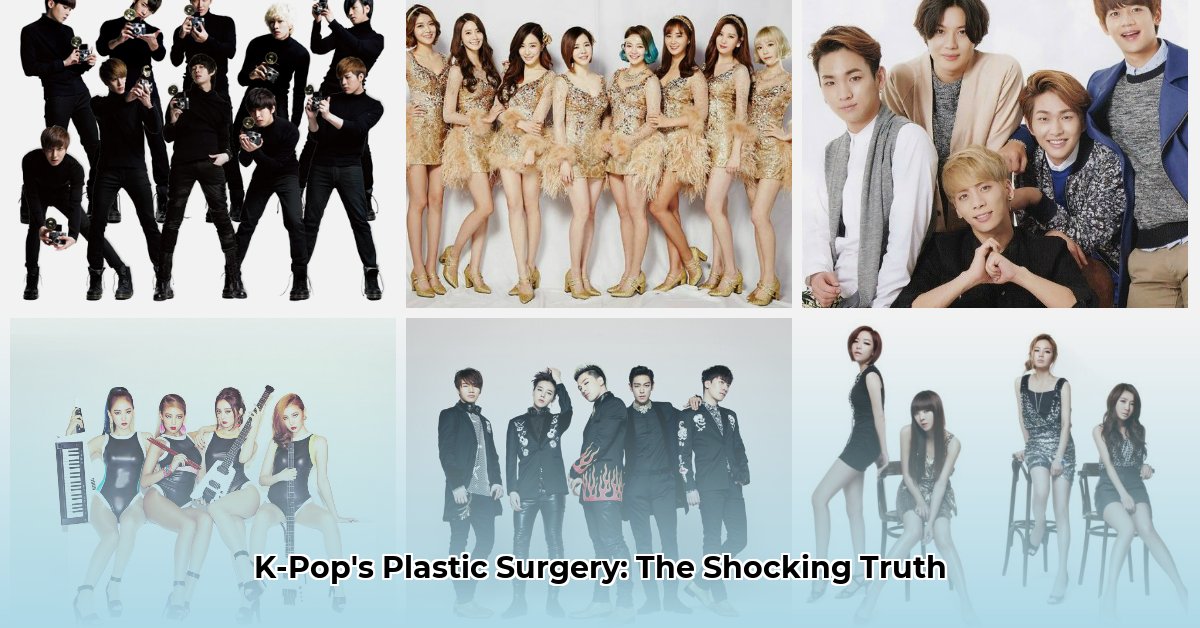Ever wonder what goes on behind the scenes of those dazzling K-Pop music videos? The truth is, the perfect looks we see aren’t always entirely natural. This article dives deep into the world of plastic surgery in K-Pop, exploring why so many idols choose to go under the knife. We’ll look at the pressure from agencies, the impact of Korean beauty standards, and the personal decisions made by the idols themselves. We’ll explore common procedures, discuss the reasons behind them, and even hear from idols who have been open about their experiences. It’s a complicated issue, but we’ll break it down in a way that’s both informative and sensitive, helping you understand the full story behind those flawless faces.
K-Pop and Plastic Surgery: A Deeper Dive into the World of Idols
The dazzling world of K-Pop often feels like a dream, but behind the shimmering lights and catchy tunes lies a reality many fans don’t fully grasp. A major part of this reality involves the intense pressure on idols to maintain a specific, often unattainable, image. This pressure frequently leads to conversations—sometimes hushed, sometimes loud—about plastic surgery in the K-Pop industry. Is it a personal choice, an industry expectation, or a complex mix of both? Let’s explore the truth behind the headlines and consider the role of Korean cultural norms and the intricate web of influences.
The High Stakes of K-Pop Beauty Standards
The K-Pop industry operates under a microscope, with every aspect of an idol’s life scrutinized by fans, media, and agencies alike. Idols are expected to be perpetually youthful, flawlessly beautiful, and utterly captivating. This isn’t simply a matter of looking good; it’s a crucial part of maintaining their success and their agency’s financial interests. The pressure to conform to a very narrow definition of beauty is immense, and many young stars feel forced to meet these demanding expectations. It’s worth remembering that these expectations have been evolving for years, subtly shifting and sometimes dramatically changing the standards of what’s deemed “ideal,” making it a constantly moving target.
Some talent agencies directly encourage or even fund cosmetic procedures for their idols, viewing it as a necessary investment in their image and marketability. This puts a focus on external presentation over internal artistic expression, raising a very real ethical question: is a flawless appearance more important than genuine talent? This isn’t a simple yes or no question; it’s a complex dilemma we need to consider. Moreover, are idols provided comprehensive information about the risks and long-term effects of these procedures? Is this prioritization of aesthetics a reflection of societal pressures, a calculated business decision, or a blend of both? The answers are rarely clear-cut.
When Idols Speak Out: Breaking the Silence
While many idols remain silent on the topic, a growing number are choosing to share their personal experiences with cosmetic enhancements, offering glimpses into the realities of navigating beauty standards within the industry. Stars like Jessi, who has openly discussed her procedures, and members of Brown Eyed Girls, who have addressed the pressure to conform, have bravely spoken about their own experiences, offering a humanizing perspective and challenging deeply rooted social stigmas. Their honesty is a game-changer; it normalizes conversations that were previously taboo, helping others feel more comfortable sharing their own stories. However, their openness doesn’t address all the complex issues surrounding the topic, and their experiences don’t necessarily reflect the experiences of all idols.
Their bravery is important, but it also highlights a significant issue: the overwhelming pressure that pushes these artists to reveal such private aspects of their lives. The choice to be open shares a very public vulnerability. Are they truly free to choose, or is the system pushing them to make this personal information public? This raises questions about idol agency contracts and the degree of autonomy afforded to artists. Furthermore, what support systems are in place for idols who choose to speak out, and how are they protected from potential backlash?
The Speculation Game: When Silence Fuels Rumors
The lack of open communication around the issue fuels a relentless wave of speculation. Online spaces are filled with endless discussions and analyses of idols’ appearances – discussions that often lead to unfounded accusations about procedures. This constant scrutiny can be incredibly damaging for anyone, but it’s especially unfair and harmful for those who have no control over the spread of these rumors. The absence of clear statements leaves plenty of room for misinterpretations, hurtful assumptions, and ultimately, unfair judgments. It’s a high price to pay for someone simply trying to make a living. In many cases, these “discussions” devolve into online bullying and harassment, further compounding the problem.
How can we combat the spread of misinformation and promote more respectful discussions about K-Pop aesthetics? This requires a collective effort from fans, media outlets, and industry insiders to prioritize factual reporting and ethical online behavior. Fact-checking initiatives and media literacy campaigns could help to curb the spread of false information and encourage more thoughtful engagement with the topic.
The Bigger Picture: Society and Self-Image
Korean beauty standards often emphasize lighter skin tones, double eyelids, a high nose bridge, and a small face with a V-shaped jawline. These cultural preferences significantly influence public perception of cosmetic enhancements, putting immense pressure on individuals to conform. When this societal pressure combines with the highly competitive nature of the K-Pop industry, the result is a perfect storm of factors influencing individual choices. Moreover, the accessibility and affordability of cosmetic procedures in South Korea contribute to the normalization of these practices.
This creates a ripple effect far beyond the K-Pop industry. The idealized images constantly promoted can negatively impact young fans, potentially fostering unrealistic expectations and contributing to body image issues like body dysmorphia (a mental health condition where you can’t stop thinking about flaws with your appearance). This necessitates a shift in societal messaging—one that prioritizes self-acceptance and healthy body image over fleeting trends. It’s a necessary step to counter the damaging impacts of unattainable beauty standards. Could promoting body positivity campaigns within the K-Pop community, featuring diverse body types and celebrating natural beauty, help to mitigate these negative effects? Furthermore, could mental health initiatives targeted at young fans provide support and resources for navigating body image concerns?
Towards a Healthier Future for K-Pop
The issue of plastic surgery in K-Pop is far more than just a trend; it’s a complex social and ethical problem with deep roots. It’s about agency, pressure, unrealistic expectations and the overall well-being of individuals. Addressing it requires a multi-pronged approach involving several key players. It demands a fundamental rethinking of beauty standards and a commitment to creating a healthier and more supportive environment for idols and fans alike.
Agencies need to prioritize the health and well-being of their artists, implementing ethical guidelines and offering comprehensive support systems, including mental health resources and unbiased counseling regarding cosmetic procedures. Idols themselves deserve greater control over their careers and their personal choices, including the freedom to express their individuality without fear of retribution. Fans and the wider public need to develop critical media literacy and actively challenge unrealistic beauty standards, promoting a culture of acceptance and celebrating the diversity of human appearance.
Ultimately, a healthier future for K-Pop requires a fundamental shift in the industry’s culture, standards, and practices. It’s a journey, not a destination, requiring constant evolution and a commitment to creating a safer, more supportive environment for all involved. The future of K-Pop depends on it. Can stricter enforcement of ethical guidelines for agencies, coupled with increased transparency and accountability, lead to meaningful change? The answers to these questions will determine the future of beauty and well-being in the K-Pop industry.
Unveiling K-Pop’s Plastic Surgery Secrets: How to Identify K-pop Idol Plastic Surgery Ethically
Key Takeaways:
- The prevalence of cosmetic procedures among K-Pop idols is undeniable, reflecting a complex mix of personal choices, industry pressures, and evolving beauty standards.
- Identifying specific procedures ethically requires careful consideration of available evidence, avoiding speculation and respecting individual privacy.
- Industry pressures significantly influence decisions, but individual motivations vary greatly.
- Fan reactions range from acceptance to concern, highlighting the ethical complexities involved.
- South Korea’s cultural normalization of plastic surgery provides a unique context to understand this phenomenon.
- Open dialogue, responsible reporting, and media literacy are crucial for navigating this complex issue ethically.
The Pressure Cooker: Industry Standards and Individual Choices
Many K-Pop idols undergo cosmetic enhancements. It’s an open secret, yet discussing it requires careful navigation to avoid perpetuating harmful stereotypes and respecting individual privacy. The pressure to conform to specific beauty ideals is immense, creating a highly competitive environment where physical appearance is often prioritized. Think of it like this: the K-Pop industry is a highly competitive arena—a beauty pageant on a global stage. Idols feel immense pressure to maintain a flawless image, fueling the demand for procedures like double eyelid surgery (a surgical procedure to create or enhance the upper eyelid crease), rhinoplasty (commonly known as a nose job), and jawline reshaping. Some agencies even incorporate clauses into contracts that incentivize or even mandate cosmetic procedures.
Yet, it’s crucial to remember this isn’t a monolithic phenomenon. While some idols openly discuss their procedures (like Jessi), many remain silent. Why? Fear of backlash? Contractual obligations? Personal preferences? All are possibilities. Furthermore, some idols may choose to undergo procedures for reasons unrelated to industry pressure, such as correcting a medical issue or addressing personal insecurities.
This highlights the complexity of how to identify K-pop idol plastic surgery ethically. We must move beyond simple observation and delve deeper into motivations and context. How do factors such as individual agency and cultural acceptance influence these choices? How can we distinguish
- Discover Affordable Singing Lessons Near Me to Unlock Your Potential - February 24, 2026
- Affordable Vocal Lessons Bring Professional Singing Guidance Within Reach - February 23, 2026
- Local Vocal Lessons Offer Expert Guidance for Every Singer - February 22, 2026










